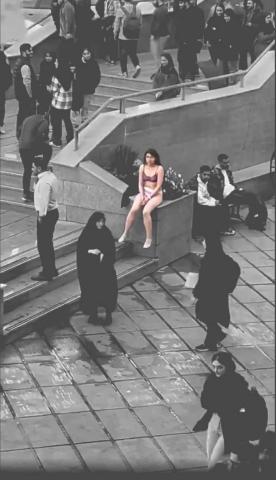Introduction
An Iranian 30 year old student was arrested and taken to a psychiatric hospital, on November 2, after undressing in protest against the mandatory hijab (Islamic headscarf) and harassment by security guards at the Islamic Azad University in Tehran, enforcing this regime policy.
Her name is Ahou Daryaei and she is a doctoral student in French literature at Azad University in Tehran.

Her actions sparked widespread discussion in Iran and internationally, with many social media users calling it a "heroic" example of civil disobedience, in line with the "Woman, Life, Freedom" movement.
However, Iranian authorities are pushing a different view, suggesting she is experiencing mental health issues.
If this woman had lived under normal circumstances, she might never have taken such a drastic action. While it is true that we have witnessed similar acts of protest in various parts of the world, this woman's response must be understood within the context of a highly religious and misogynistic society. In a society where women do not have autonomy over their own bodies, her act of nudity reveals the overwhelming pressure she has faced.
The regime in Iran claims ownership over women's bodies, using violence as a tool to enforce this control – the very same control that led to the tragic murder of Mahsa Amini.
This woman is an ordinary Iranian girl, attending university and trying g to breathe in a suffocating atmosphere devoid of basic rights. When being accused about her hijab, she reacted in the only way she felt she could.
Whether her actions were driven by anger, despair, nervous pressure, or courage, this woman's protest movement is commendable. We admire her for standing alone against a tyrannical religious regime that views itself as the owner of her body. Today, the pillars of this oppressive system have been shaken by her brave act.
Iranian women do not seek pity. They ask for support in their ongoing struggle for freedom, human rights and equality
The trifle freedoms that Iranian society can see today are the result of courageous acts by women like her. Just as the killing of Mahsa Amini sparked irreversible changes in Iranian society, so too does this woman's defiance mark the beginning of a new chapter. The "Woman, Life, Freedom" movement may not have brought about the regime change many desired, but it has sparked tremendous social progress and the fight for fundamental rights and freedoms AND this is the beginning of the path to freedom…
Despite decades of oppression, Iranian women are stronger than ever, demanding their rights – even those women who are religious or support the regime recognize the necessity for change. Limitations have given birth to creativity and empowerment, and the new generation can no longer be restrained by the Islamic regime.
Iranian women do not seek pity; they ask for support in their ongoing struggle for freedom, human rights and equality.
Text by: Servas Women
Images: from social media